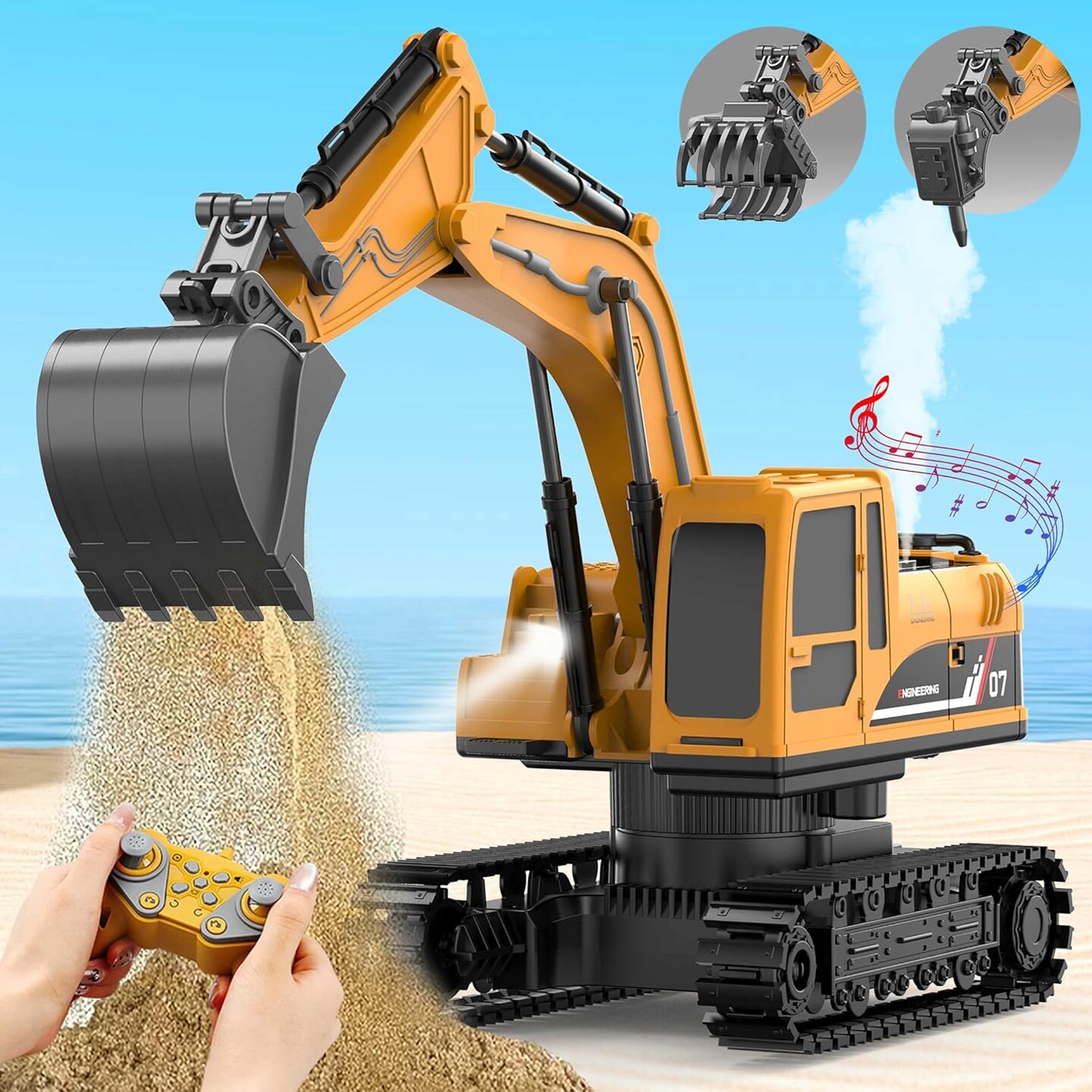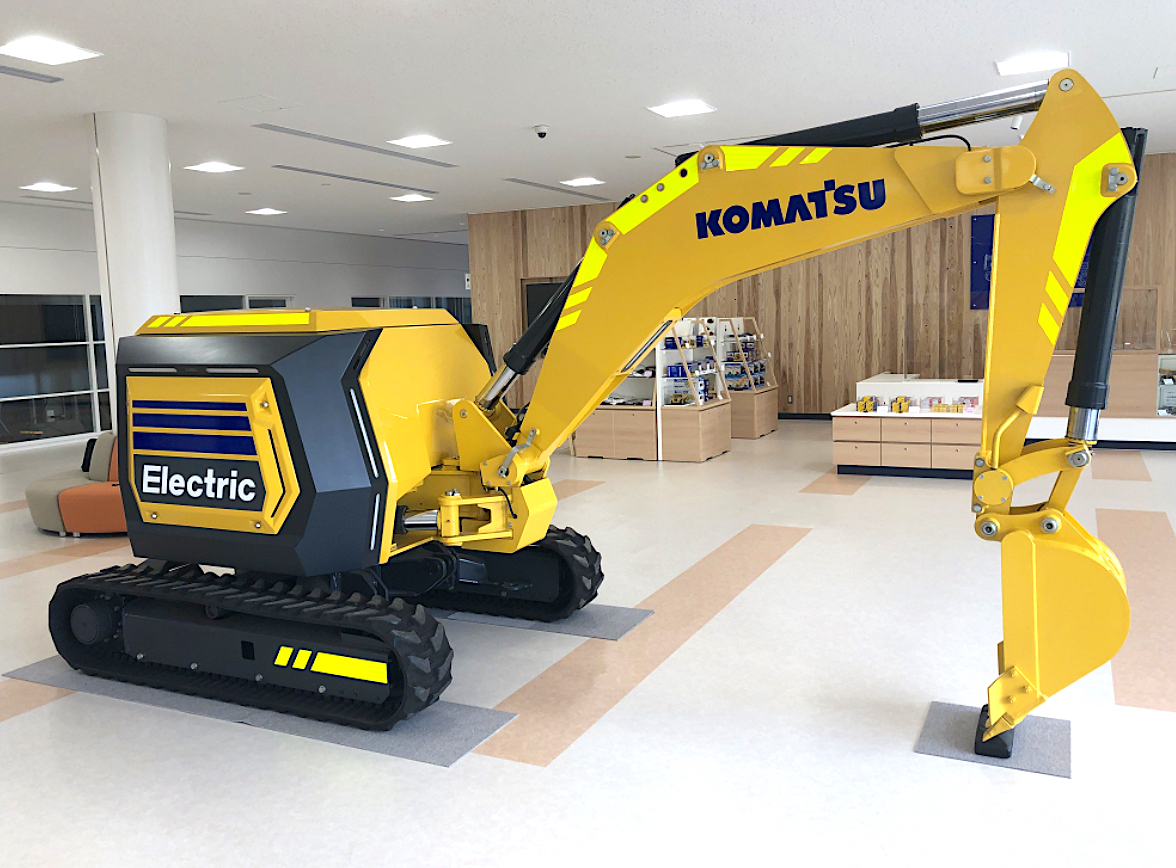Boosting Excavation Productivity with a rc excavator: Best Practices
Wiki Article
Discover the Significance of Excavator in Modern Building Projects
Excavators are vital devices in contemporary construction tasks. Their flexibility permits them to carry out a wide array of jobs, from excavating and grading to demolition and website prep work. Advanced functions, such as hydraulic add-ons and GPS, improve their capabilities and performance on job sites. As the sector progresses, the importance of excavators grows also extra. Recognizing their function can disclose insights into the future of building methods. What exists in advance for these devices?The Adaptability of Excavators in Numerous Projects
Although excavators are often connected with large-scale building jobs, their adaptability permits them to be used in a variety of applications, from property landscape design to utility maintenance. In urban setups, excavators can browse tight rooms to dig foundations for homes or mount drainage systems. Their capacity to carry out fragile jobs makes them perfect for landscaping tasks, where they can excavate for fish ponds or plant trees. Additionally, excavators play an important duty in energy maintenance, successfully excavating trenches for pipelines or cable televisions without disrupting surrounding locations. In farming applications, they help in land clearing and dirt preparation. Their flexibility enables them to be equipped with various add-ons, enhancing their functionality throughout various tasks. This diverse nature of excavators not just enhances numerous building processes but likewise shows their indispensable duty in modern-day infrastructure development and maintenance.Key Functions and Kinds Of Excavators
The discussion on essential functions and types of excavators highlights the crucial attributes that make these machines important in building and construction. Various excavator types, each designed for certain jobs, show their versatility and effectiveness across various applications. rc excavator. Recognizing these functions and classifications is essential for optimizing their use in modern building projectsExcavator Enters Overview
Excavators play a pivotal function in contemporary building, offering adaptability and efficiency across numerous jobs. These hefty equipment units come in several types, each customized for particular applications. One of the most common kinds consist of spider excavators, understood for their security on unequal terrain, and rolled excavators, which provide better mobility on smooth surfaces. Mini excavators are favored for small-scale projects and tight spaces, while long-reach excavators are designed for deep excavating. Furthermore, there are specific excavators, such as hydraulic excavators, which improve power and accuracy. Each kind includes one-of-a-kind capabilities, making them crucial for jobs ranging from digging and grading to demolition and material handling. Understanding these variations permits building professionals to pick the appropriate excavator for their task needs.Trick Includes Explained
Comprehending the essential features of excavators improves their effective application in building jobs. Excavators are characterized by their powerful hydraulic systems, which offer the essential pressure for excavating, training, and relocating materials. Their articulated arms enable for a vast array of motion, assisting in specific operations in confined areas. Additionally, the selection of add-ons, such as buckets, grapples, and augers, broadens their adaptability to fulfill different job demands. The dimension and weight of excavators also add to their stability and maneuverability on various surfaces. Additionally, developments in modern technology have actually brought about the assimilation of GPS and automation, improving precision and efficiency in excavation jobs. These features collectively position excavators as crucial tools in contemporary building and construction.Applications in Building
Transforming building and construction sites, excavators play a pivotal duty across numerous applications, varying from property structure jobs to massive framework growths. These flexible devices are equipped for tasks such as excavating structures, trenching for utilities, and site grading. Various kinds of excavators, including spider, rolled, and mini excavators, offer particular advantages tailored to the project needs. Spider excavators succeed in harsh terrains, while wheeled excavators provide flexibility on smooth surface areas. Mini excavators are optimal for constrained areas, making them popular in city settings. The efficiency and power of excavators significantly quicken building and construction procedures, ensuring timely task completion. Their adaptability better boosts their importance, permitting construction groups to tackle a diverse array of challenges successfully.Enhancing Performance and Efficiency on Job Sites
Optimizing performance and productivity on work sites is an essential goal in contemporary construction. Excavators play a crucial duty in attaining this objective by streamlining different jobs. Their capability to execute multiple functions-- such as grading, excavating, and training-- decreases the demand for added tools, consequently conserving time and resources.Moreover, excavators improve operations by enabling faster completion of projects. With advanced attributes like hydraulic accessories and GPS modern technology, they can execute exact operations that reduce errors and revamp. This accuracy not only improves the high quality of job yet also enhances product usage, contributing to set you back savings.The versatility of excavators enables them to adapt to different site problems, making sure that projects progress smoothly no matter obstacles. By incorporating excavators right into construction processes, teams can greatly improve their general performance, leading to prompt project conclusion and enhanced success.Security Benefits of Utilizing Excavators
Excavators substantially improve safety on building sites via boosted operator visibility and decreased manual labor dangers. By offering operators with a clear sight of their surroundings, excavators help to avoid mishaps and injuries. In addition, the equipment reduces the need for workers to participate in harmful hands-on tasks, additionally promoting a much safer work environment.Improved Operator Visibility
Although construction sites can be disorderly and go to the website full of potential risks, improved driver visibility plays an important role in making sure security when using excavators. Modern excavators are created with huge, unblocked home windows and tactically positioned mirrors, enabling operators to maintain a clear view of their environments (rc excavator). This enhanced visibility is crucial for identifying pedestrians, other machinery, and various barriers, significantly decreasing the danger of crashes. Additionally, several excavators include sophisticated technology, such as sensing units and cameras, to provide operators with extra perspectives, better improving understanding. The capability to see even more plainly not only help in efficient operation yet additionally cultivates a more secure job environment, making it simpler for operators to browse complex building and construction sites without compromising security standardsMinimized Handbook Labor Threats
When manual work is minimized through the use of excavators, numerous safety and security advantages emerge, significantly enhancing the well-being of construction workers. Excavators decrease the physical stress connected with heavy lifting and repetitive jobs, successfully reducing the threat of musculoskeletal injuries. By automating procedures such as digging, grading, and relocating products, they allow workers to preserve a much safer range from potential dangers. In addition, excavators are geared up with sophisticated safety functions, such as rollover protection systems and boosted operator ergonomics, which better secure personnel on site. The result is a substantial decrease in office accidents and injuries, resulting in increased performance and morale amongst building teams. Inevitably, the fostering of excavators adds to a much safer and more reliable construction atmosphere.Excavators in Earthmoving and Website Prep Work
In modern-day construction, a substantial section of earthmoving and site prep work jobs counts on the efficiency and adaptability of excavators. These makers are created to manage various dirt kinds and terrain, making them vital for grading, excavating, and trenching activities. Their hydraulic arms can be equipped with various attachments, such as augers and buckets, enabling operators to personalize their method based on particular task requirements.Excavators excel at moving huge volumes of earth quickly and successfully, which speeds up the general construction timeline. They can browse limited areas and testing websites where traditional equipment may have a hard time, boosting performance. In addition, the accuracy of excavators assurances that website prep work abides by rigorous specifications, reducing the risk of errors that could result in pricey rework.The Role of Excavators in Demolition Tasks
Excavators play an important function in demolition jobs, as they possess the power and agility needed to take apart frameworks efficiently. Furnished with numerous add-ons such as hydraulic breakers, shears, and grapples, these devices can adjust to various demolition demands, whether for little structures or big industrial websites. Their convenience enables drivers to take on complex projects while keeping security and precision.In addition to their demolition capabilities, excavators promote particles removal, making sure that work websites stay safe and orderly. By breaking down frameworks right into convenient items, they permit streamlined clearing and recycling of materials, aligning with contemporary imp source sustainability efforts.Moreover, excavators can access limited rooms and browse uneven surface, making them important in metropolitan demolition tasks. Generally, their durable style and multifunctionality make excavators an important asset in the demolition phase of construction, adding substantially to task timelines and efficiency.

Future Patterns in Excavator Innovation and Use
As the construction sector advances, developments in excavator technology are positioned to change their usage and efficiency substantially. One significant pattern is the integration of automation and expert system, enabling excavators to run with very little human intervention. This shift will certainly boost precision in jobs such as grading and trenching, decreasing human mistake and increasing productivity.Additionally, the rise of electrical and hybrid excavators is forming an extra lasting building and construction atmosphere, lowering carbon exhausts and gas costs. Improved telematics systems article source are additionally emerging, making it possible for real-time tracking of machine efficiency and upkeep needs, which can lead to much better functional performance and longer tools lifespan.Moreover, improvements in attachment technology are broadening the convenience of excavators, permitting them to carry out a more comprehensive array of tasks. The mix of these trends demonstrates a future where excavators are smarter, greener, and much more versatile, ultimately improving building and construction task dynamics.
Often Asked Questions
Exactly How Do Excavators Compare to Other Construction Equipment?
Excavators, identified by their flexibility and power, master digging and earthmoving compared to other equipment. Their ability to execute numerous jobs, consisting of lifting and demolition, makes them crucial in building jobs, enhancing general effectiveness.
What Is the Average Life Expectancy of an Excavator?
The ordinary life-span of an excavator usually varies from 7,000 to 10,000 operating hours, depending on upkeep, usage problems, and model. Correct treatment can expand this life expectancy, ensuring peak efficiency throughout its operational years.Exactly How Are Excavators Kept for Optimum Performance?
Excavators call for normal upkeep for peak efficiency, consisting of regular examinations, fluid checks, filter replacements, and timely repair services. Carrying out a preventive upkeep schedule aids lengthen their life-span and guarantees efficient operation in various building and construction environments.What Are the Prices Related To Acquiring an excavator vs. renting out?
The expenses connected with leasing versus getting an excavator differ substantially. Renting out offers reduced upfront expenditures yet can accumulate in time, while acquiring calls for a significant initial investment, but supplies long-lasting cost savings and asset possession benefits.What Training Is Required to Run an Excavator?
Operating an excavator requires specialized training, generally including safety and security procedures, maker procedure strategies, and environmental awareness. Certification programs typically mandate functional experience, allowing operators to deal with numerous jobs efficiently while making certain conformity with industry guidelines. The most common kinds include crawler excavators, recognized for their stability on uneven terrain, and wheeled excavators, which give better wheelchair on paved surface areas. Tiny excavators are favored for small-scale jobs and tight rooms, while long-reach excavators are made for deep digging. Additionally, there are specific excavators, such as hydraulic excavators, which boost power and precision. Different kinds of excavators, including spider, rolled, and mini excavators, provide certain benefits customized to the project requirements. Spider excavators stand out in rough surfaces, while wheeled excavators offer flexibility on paved surfaces.Report this wiki page